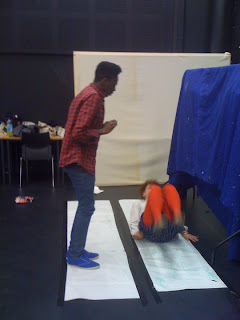We spent a while listening to different pieces of music that we'd already been looking at, (Steve Reich came into full force!) and spent a while doing some warm up games and focus exercises. One particularly effective one that Jessie led was starting on the floor, she got us to become more and more aware of each part of our body and our breathing, before then having to try and pull ourselves of the floor but trying it using different parts of our body. This progressed on to us walking around the room, picturing someone we knew and almost becoming them as we mimiced and thought about every aspect of their walk and how they hold themselves etc. It was a really funny experience because the latter part of the exercise I'd watched many times as an effective focus warm up for character actors, thinking about each part of their character, and so you would have thought I'd be prepared for it. And yet, I still managed to slip into thinking about someone very personal and close to me, which meant when Jessie asked us to make a sound they would make i froze up, unable to put a stamp on how I felt or wanted to represent them. This may all seem incredibly irrelevant but it was interesting and intriguing non-the-less!
After the this, as we happened to get interupted by some visitors and we were all hungry for lunch anyway, we started to have a look around youtube for some inspiration and any recent videos we'd seen. The following video was particularly influential in looking at the ideas of the body, of connection with another and of the concepts we've previously explored of fitting into a mould or ideal.
Dead Dreams of Monochrome Men was DV8's first stage show to be professionally adapted for film. Loosely based on the story of serial killer Dennis Nilsen, it explores the interwoven notions of loneliness, desire and trust. Founded upon the conviction that societal homophobia often results in tragic consequences, the work grapples with the disturbing forces that drove Nilsen to kill for company.
This concept was then rehearsed over a couple of days, giving Jessie and Kwaku a chance to collect their ideas of the speech they would improvise and focus their thoughts and emotions regarding the movement and tone of the piece. During a couple of the runs (when I wasn't editing the sound recordings as seen in the images), I took audience/director notes to see what as an observer I was experiencing and to give Jessie & Kwaku some constructive feedback on their improvising.
Directorial/Observer Notes
Run 1
* Who is the conversation supposed to be with?
- Interview
- Meeting with a stranger or a friend
- Questionnaire or scientific exploration
- One person, multiple or abstract, rhetorical
* What tone of voice should Kwaku have?
- Robotic
- Self-reflective
- Investigative
- Troubled
* Labels
- Body Features
- Labels stuck on us
- Forced onto us by society's rules or do we seek them out?
- Do we want a label on us as it gives us a place in society?
- Interesting struggle between the two
* Gender balance, Jessie & Kwaku,- Power difference
- Place in society
* Measuring
- How do you measure self
- Measure identity
* Fitting into a mould
* Putting into a box
* Mimicing
* Rationalise
* Asking questions to learn more about the self
- Finding more about the world through the self
- Reminds me of the way we define our selves by the other
* Looking for the pefect mould to create and fit into
* Jessie more about living with the mould
- Getting through the day
- Carrying on
- No matter what
- Searching for comfort
* When Jessie stands up fully & straight signals the switch, Kwaku crouched. Made a lovely tableau composition from many angles. Paused moment. Try to hold
* Do the questions go on for too long?
* Nice rotation on the spot
- Small, precise movements
- Good contrast to the more erratic
- Would be good to see some more height in general to add to the levels, breaking out of the box
Run 2
* Kwaku voice seemed
- Quite intrusive
- Creepy
- Desperate
- Attacking and yet vunerable
- Push it further and perhaps add some colour, happy when thinking about certain questions? Ruin the mood?
* Should they acknowledge each other? Could probably work either way but needs to be consitent so we can think about what that means for the piece and what is being represented
* Questions, definatley work best as rather abstract and improvised, but they need to be either more varied, as they seem to lead us to think its about something rahter specific, or we need to think of an underlying narrative.
* Good rise and fall, Jessie trying to get up, pushing on, lovely
* Noise, energy of movement, can that sync with the subject matter or the tension of the questions?
Texts & Links







